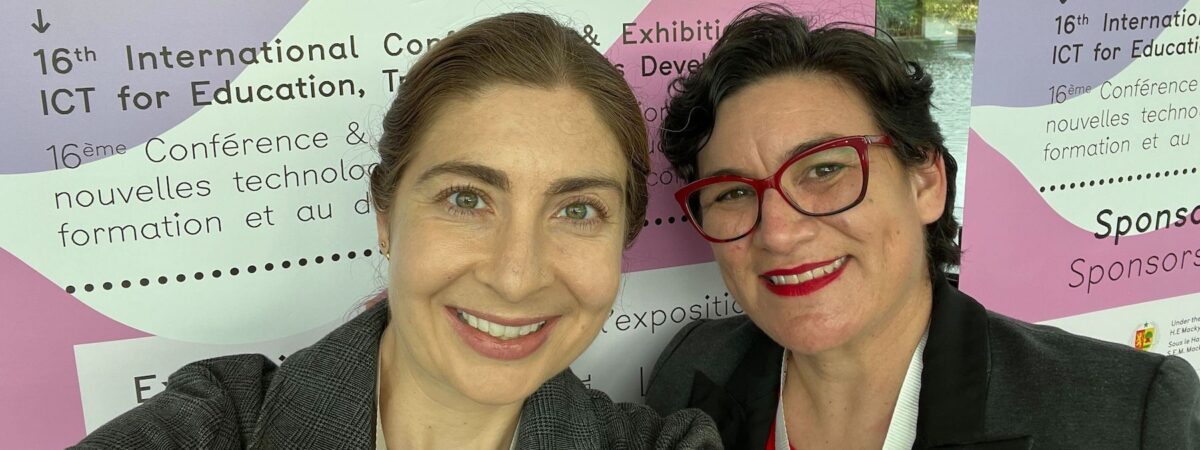Digital Promise had the opportunity to present and learn from many experts at the
eLearning Africa 2023 conference, in Dakar, Senegal, from May 24-26, 2023. The 16th International Conference & Exhibition on ICT for Education, Training & Skills Development explored new models for learning, focusing on innovations in sustainability, self-reliance, equity, and resilience.
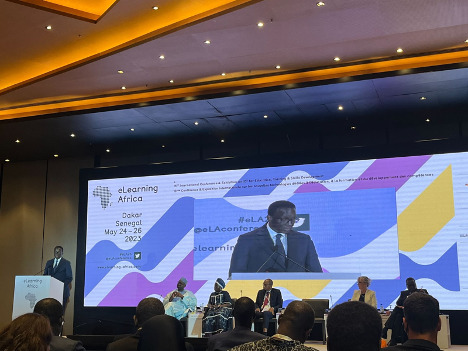
Senegalese Prime Minister Abdoulaye Ba discusses the importance of investing in eLearning at the opening plenary of the 16th annual eLearning Africa Conference in Dakar, Senegal.
During the conference, Rita Fennelly-Atkinson, director of Micro-credentials, and April Williamson, Haiti project director, presented in a panel discussion entitled, “How Digital Credentials are Transforming Learning and Recognition in the Workplace.”
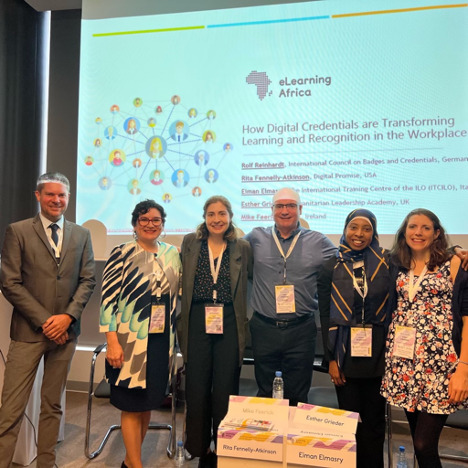
Rita Fennelly-Atkinson and April Williamson participate in a panel discussion entitled, “How Digital Credentials are Transforming Learning and Recognition in the Workplace” alongside Rolf Reinhardt, Mike Feerick, Eiman Elmasry, and Esther Grieder.
The Digital Promise presentation shared expertise on certifying competencies and skills with micro-credentials in a global context. Since 2013, Digital Promise has been a leader and innovator in micro-credentials (issued in the form of digital badges), by conducting research, developing micro-credentials for educators, and launching the Digital Promise Micro-credential Platform. Leveraging our experience in micro-credentials for educators, we have also more recently expanded into workforce and international contexts.
Our experience in certifying competencies and skills with micro-credentials has provided a few key lessons that can be applied in all contexts:
- Competency-based education, assessment, and credentialing lead to improved learner outcomes.
- Learners desire and seek autonomy, flexibility, and feasibility in the professional learning and micro-credentials they pursue.
- Learner adoption and use of any micro-credentialing ecosystem is most successful when incentives (monetary, employability, and advancement) and recognition (licensure, recertification, credentials, university credit, and employment) are included.
While the eLearning Africa conference covered a variety of themes, ranging from employability, skills, and teacher training to edtech tools and learning analytics, a few through-lines and themes emerged throughout the sessions:
- There is universal interest across every African country in adopting educational technology, and individual teachers are the key to successfully guiding the technology into the classroom in local contexts. Edtech companies get it wrong when they try to bypass or replace educators. In a presentation entitled, “Innovative Training for Digital Teachers,” Oluwakemi Olurinola, an edtech researcher and consultant based in Nigeria, noted that technology is coming to the education sector whether we are prepared or not. She posited that we have an obligation to prepare teachers for this reality through tailored, continued professional development that is localized, need-based, and differentiated and promotes reflective practice; provides opportunities for peer collaboration and networking; and is integrated with available technology and content, so that they can meet students’ current and future needs.
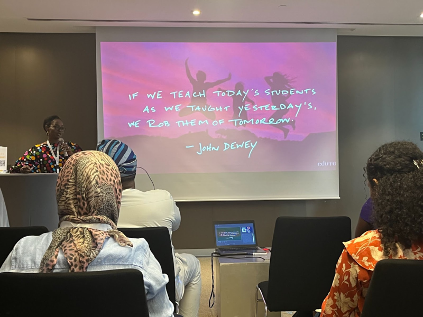
Oluwakemi Olurinola of Olabisi Onabanjo University in Nigeria shares best practices and innovative models for preparing digital teachers.
- Cross-sectoral partnerships are critical to successful implementation and sustainability of eLearning. In a session entitled, “Building and Sustaining the EdTech Ecosystem in Africa,” panelists highlighted the need for collaborative solutions across the public, private, and civil society sectors that encompass connectivity, devices, context-specific content, and capacity. Government support, recognition, and accreditation are necessary for successful implementation and long-term sustainability of digital learning initiatives. To effectively work with governments, innovators must ensure that they understand the priorities and barriers governments are facing, are addressing their pain points, and are engaging them in co-creation of any eLearning approaches from the start.
- We need to simultaneously pursue low-tech and offline-first eLearning solutions while intentionally and equitably taking advantage of emerging technologies, such as augmented/virtual reality and artificial intelligence. Many learners across Africa and around the world don’t yet have access to reliable power, connectivity, and devices for digital learning, so we need to develop low-tech options to meet the needs of these communities. When developing eLearning strategies, we should start with the need and desired outcome in mind and choose the technology that will meet that need, as opposed to the prescriptive or blanket application of particular technologies.At the same time, Africa can be a leader in developing and applying new technologies. In the conference’s lively closing debate, panelists considered the question of whether AI will do more harm than good in education in Africa. The proliferation of AI in learning spaces carries risks and equity concerns. Additionally, while machines can never replace educators, who have the unique capacity to build human and cultural connections, they do provide opportunities to supplement and enhance instruction. For example, as debate participant Donald Clark noted, AI will allow us to more easily and efficiently provide content and instruction in students’ mother tongue.
- There is a high need to build and credential in-demand skills. The most highly sought competencies for current and future workforce needs are focused on in-demand industry and professional skills. Industry skills range from globalized technology skills in coding, data, and AI to more localized trade skills in sectors such as electrical, manufacturing, and energy. Regardless of industry or education sector, professional skills are becoming increasingly important to the ability of people to transition successfully with the ever-evolving tech-based economy.Building capacity for educators to teach and incorporate these skills into their curriculum is also needed. Effectively assessing and recognizing these skills with credentials plays a key role helping learners to transition into or advance within the workforce.
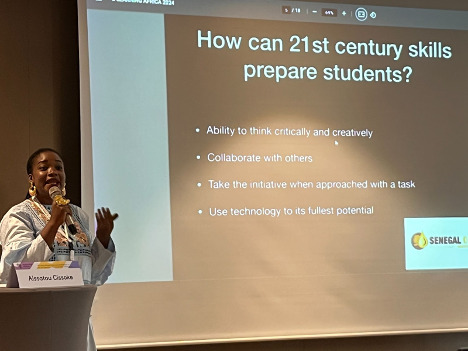
Aissatou Cissoko from Senegal Oil and Gas Academy shares key skills needed by 21st century students during the “How to Become a 21st Century Worker with Future Ready Skills” session at eLearning Africa 2023.
- The biggest gap in education resides in the ability of learners to transition from instruction or training to employment. More learners than ever have access to and are engaging in a range of learning experiences designed to support their holistic growth and development. However, while many learners successfully complete their education and training programs, very few are able to transition this achievement into employment. As a result, there is growing interest in how to close this gap and enable people to successfully transition to employment through a variety of supports, tools, and recognition mechanisms.
- There is a global demand for high-quality content contextualized for local communities, and educators need support to find and prioritize the high-quality digital content that does exist. One of the resounding themes of eLearning Africa was that there is an enormous amount of content, but that little of it is of both high-quality and aligned to the local context. Designing for the local context means that content needs to be available in the local language(s), while addressing the realities and needs of the local communities. At the same time, educators struggle to wade through the vast amount of digital content that already exists in order to find those resources that are high-quality and culturally relevant. At the conference, UNESCO shared that to meet this need, they are creating global gateways to public digital learning – an initiative that will, in part, map and describe existing public digital learning platforms and content.
Interested in learning more or partnering with us? Learn more about our work in Global Education and Micro-credentials. Please contact us at global@digitalpromise.org and microcredentials@digitalpromise.org.
